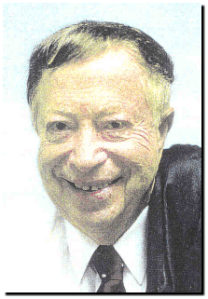
Abe Hirschfeld
|
EXCLUSIVE!
Juror Claims Abe Hirschfeld Victim Of Political Vendetta by Prosecutor
EDITOR’S NOTE: Morgan Godwin of
Manhattan served on the jury when Abe Hirschfeld was prosecuted last month
by District Attorney Robert Morgenthau for tax evasion in a criminal fraud
case at New York State Supreme Court. After a mistrial was declared,
Godwin put his thoughts down on three pages, single-spaced, and sent them
to Hirschfeld. In an accompanying letter, he wrote: “I have come to
believe that what you and several of your witnesses said during the trial
is true -
that the charges and the circumstances surrounding the trial were
politically motivated.”
A
Juror's Trials
By MORGAN GODWIN
HE
prosecution charged the defendant, Abraham Hirschfeld and several of his
business enterprises, with 123 counts of criminal fraud…I believed that
the defendants were presumed to be not guilty unless the prosecution
proved otherwise beyond reasonable doubt. Therefore, the burden of proof
was on the prosecution.
Imagine
my surprise when the prosecution’s two principal witnesses proved to
have signed cooperation agreements with the district attorney’s office
to avoid prosecution for crimes they might have committed.
If
that wasn’t sufficient to raise reasonable doubt as to the veracity of
their testimony, their manner on the stand, underlined by countless “I
don’t know,” “I’m not sure,” “I don’t recall,” and other
examples of seeming lapses of memory or perhaps selective recall, cast
their testimony into the gravest doubt in my mind…their body language
further undermined their credibility.
“To
me there is something
fundamentally wicked to
trading votes that could
result in a defendant’s fate
being decided just for the
sake of consensus and
unanimity.” |
As
the case progressed, I began to feel that the district attorney’s raid
on the defendant’s offices had been more a fishing expedition than a
search for specific evidence…The jury did find one of the defendants
guilty on five counts relating to the 1989 Broadway production Prince
of Central Park. In that instance the evidence appeared to indicate
that there had been irregularities, and I was persuaded to vote guilty
with the eleven other jurors on those five counts.
During
deliberations I was accused of setting a different excessively high level
of reasonable doubt in relation to the remaining 118 counts.
It was clear that there was one
[juror] who was determined to move the jury toward a vote of guilty on all
counts. That juror acquired several supporters who focused their efforts
on shifting those who wished to vote not guilty to guilty. Several did
change their votes as a result of the small group of
“find them guilty” activists.
When
it became clear that…they were just not going to get everyone to vote
guilty on all counts, the group shifted their efforts to getting various
jurors to trade votes so that even if the defendants were found not guilty
on some counts, at least there would be unanimous votes on all counts.
To
me there is something fundamentally wicked to trading votes that could
result in a defendant’s fate being decided just for the sake of
consensus and unanimity. When I was asked to vote guilty on certain counts
in return for unanimous not guilty votes on others without regard to the
defendant’s guilt or innocence, I refused. At that point I became the
object of increasing verbal assault. My intelligence was questioned, as
was my objectivity…I sent a note to the judge asking if it was legal and
just to trade votes…
The
judge’s response reinforced my belief that to trade votes could not be
fair and just for the defendants, and I again refused to change my vote.
The result was the declaration of a mistrial -
a result that was a profound disappointment to me since it left the
prosecution with the option of retrying the defendants.
I
feel more than ever that the prosecution simply failed to make its case.
In my view, their case had holes in it that you could have sailed the
Queen Elizabeth II through.
While
a mistrial may have left the question of guilt or innocence unanswered, it
was, in my view, a price worth paying to ensure that injustice did not
occur for the sake of consensus.
If
it comes to a choice of consensus and justice, consensus be damned!
|
